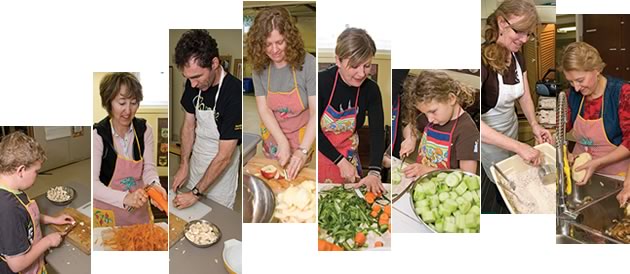Palgrave Community Kitchen
Palgrave’s certified commercial kitchen is open to cooks, caterers and community groups.
It’s not hard to imagine Barb Imrie as a young Girl Guide. When I visited her in the new community kitchen in the basement of the Palgrave United Church, this mother of three teenagers was elbow-deep in a batch of blueberry and cranberry muffins. They were for the potluck lunch that would complement the congregation’s annual general meeting later that day.
We had a few private moments before churchgoers started to arrive carrying their slow cookers filled with hot soup and wooden bowls ready for salad greens. With her long red hair hastily pulled back in a youthful ponytail, Barb directed traffic in the busy kitchen with an ease that suggested she likely organized Girl Guide cookie drives too. A smudge of flour decorated her chin.
Barb is chair of the Palgrave United Church Environment Committee, which, as readers may recall, was the force that helped convert the church’s annual turkey supper from a meal that would have made Mr. Swanson proud to one that sources almost all of its main ingredients from within a ten-mile radius of the village (one of the reasons, the committee members were included among this magazine’s Local Heroes in 2008).
With about 500 meals now being served at the popular dinner, the United Church Women (UCW) were faced with a mountain of dirty dishes. Church kitchens, when used to prepare food for church functions, are exempt from the regulations that health officials demand from other “commercial” kitchens. But the ladies were nonetheless concerned that rules might change. They wanted an industrial dishwasher.
Barb and the committee already had plans brewing to create a community garden that could supply some of the church’s needs when the UCW’s dishwasher idea captured her imagination. She explains, “A little voice said to me that maybe it’s time to create a community kitchen.”
So the committee applied to the Town of Caledon’s Green Fund for the money it needed to upgrade the kitchen to certifiable standards and included plans to create a 4H Baking Club. When a church elder, Esther Downey, passed away and willed some money to the church, they had the sum they needed.
The industrial dishwasher cost them about $11,000 once they had figured out all the associated plumbing and wiring. They put in a large double stainless-steel sink and a hand-washing station, upgraded the floor, and had money left over to purchase some excellent small appliances. The wall behind the main working counter is lined with an impressive array of shiny mixers, blenders and processors.

From left: Saverio, Eva, Russell, Heather, Amanda, Mia, Barb and Ruth peel, cut, chop, scoop and stir at a recent soup bee held at the community kitchen. Photo by Pete Paterson.
Last September, Peel Health certified the Palgrave kitchen, and Barb, the Palgrave Environment Committee and the 4H Baking Club were in business. Their grand opening took place on December 13. Since then more than 400 people have used the community kitchen.
The Beavers have baked cookies, Barb and her husband Russell made butternut squash soup for Christmas presents, and the kitchen hosted a fair-trade chocolate-cake-baking workshop. They have also held two food handlers’ courses and Barb says she is now one of twenty-three people with “certified hands.”
But it’s the 4H kids who have been the largest presence. Plans were that once a week this group of 10- to 19- year-olds would spend an evening learning the ups and downs of baking. Soon after they began, however, the members elected to narrow their horizon. Baking was okay, but pizza was better. So they morphed into the 4H Pizza Club and have been happier ever since.
Kori de Boer, the 16-year-old daughter of Caledon councillor Nick de Boer, is one of the 4Hers. When I asked her why she participated, Kori replied with the deadpan directness of a teenager, “Because I like doing 4H and I like pizza.”
Kori’s favourite is pepperoni and bacon, and she’s been able to show off her skills at home. “I think I’ve made it three or four times for my family,” Kori told me, and there seemed to be a hint of pride in the voice of this young woman who says she’d like to farm when she grows up.
The committee’s plans for the kitchen sound remarkably sustainable. To support the monthly community dinners, canning bees, cooking classes and other events, the committee is planting a small kitchen garden that will supply herbs and other basic cooking ingredients. The committee’s larger dream will come true when the new Albion Hills Community Farm and Learning Centre is growing a good proportion of the produce the kitchen can use.
Together with Caledon Countryside Alliance, the environment committee was successful in a bid to take over the farm at Albion Hills Conservation Area. Initially, unprocessed produce grown on the site will be sent to the Palgrave kitchen. There it will be washed, peeled, chopped, diced and otherwise made ready for the conservation area’s kitchen, which feeds some 60,000 meals a year, mostly to kids attending programs at the field centre. Other plans for the farm include the development of allotment gardens.
With all of this activity, the Palgrave kitchen will be a pretty active place. Nonetheless, Barb hopes that other food producers will use it too. Currently, health rules dictate that food products sold to the public must be prepared in a certified kitchen. (There are some exceptions such as products sold at farmers’ markets and for church functions.)
Caterer and Palgrave resident Sarah Caylor has to cook in her customers’ kitchens because her own kitchen is not yet certified. Although the $20 per hour fee (to a maximum of $100) to rent the Palgrave kitchen would add to her independent costs, Sarah is enthusiastic about the concept: “I think it’s a great idea for people who want to hold a canning bee or a cooking class.” She also agrees that if a few people could come together to share the kitchen – and the fee – that could work too.
Not only is the kitchen proving to be a great community meeting place, it’s bringing home the green message too. As she clears a stray lock of hair, Barb says, “We almost have the church off Styrofoam.” The kitchen is Bullfrog-powered and free of non-stick cookware, which reduces exposure to phthalates. But this means that Barb is on the hunt again. Anyone have old cast-iron frying pans they’d like to donate?
More Info
Palgrave Community Kitchen
To Book The Kitchen, Call 905-880-0303 Rental Fee $20/Hour, To a Maximum of $100
Questions About The Kitchen? Call 905-880-4905 Or Check Out Palgravekitchen.Org







Thanks for giving this Thanksgiving!
The Palgrave community kitchen was featured in a story “Homegrown in the Hills” in the summer issue of In the Hills. The article ended with the plea, “Anyone have old cast-iron frying pans they’d like to donate?”
Last week I arrived at my door to find two brand new cast iron frying pans. No note.
THANK YOU! Just another example of the Caledon community coming together to help. And just in time to use to make stuffing for 450 lbs of turkey.
On Thursday Oct 7 starting at 4pm another example of community committment continues in Caledon when we host our ANNUAL TURKEY DINNER!
Thank you to the 55 volunteers who make this community dinner happen volunteering 500 hours to shell peas, blanch corn, peel potatoes and rutabaga, grate cabbage, make stuffing, cook turkeys, bake pies and wash dishes!
To the seven local farmers who grow our amazing menu of turkey, peas, corn, potatoes, rutabaga, carrots, cabbage, onions, bread, apples (Van Dyken Brothers; Steve Smith; Betty and Ron French; Gerald and Trish Reid; Albion Orchards, Spirit Tree Cidery; Broadway Markets) within 10 miles of our event.
To the 500 folks who come to eat, chat with their neighbours, share a meal (maybe even take one home) and celebrate the harvest.
Happy Thanksgiving.
Barb Imrie
Palgrave Community Kitchen
34 Pine Avenue (map)
palgravekitchen.org
Barb Imrie on Oct 4, 2010 at 1:25 pm |